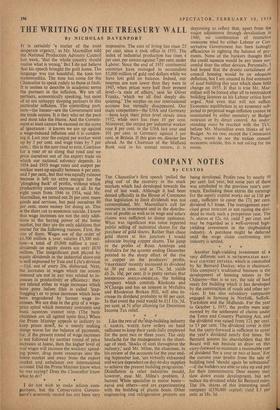THE WRITING ON THE TREASURY WALL
By NICHOLAS DAVENPORT
IT is certainly 'a matter of the most desperate urgency,' as Mr. Macmillan told the National Production Advisory Council last week, 'that the whole country should realise what is wrong.' But I do not believe that his speech brought the guilt home. The language was too beautiful; the tone too statesmanlike. The time has come for the Chancellor to speak rudely to those at fault. It is useless to describe in academic terms the partners in the inflation. We are all partners, economically speaking, but most of us are unhappy sleeping partners in this particular inflation. The controlling part- ners—the bosses=are the Government and the trade unions. It is they who set the pace and must take the blame. And the Govern- ment at least cannot be excused on the score of ignorance: it knows we are up against a wage-induced inflation and it is condon- ing it. Last year the output per worker went up by 3 per cent. and wage rates by 7 per cent.: this is the sure road to ruin. Continue for a year or so along that road and we price ourselves out of the export trade on which our national solvency depends. In 1954 and 1953 wage rates and output per worker went up equally between 4 per cent. and 5 per cent., but that was equally ruinous because it left no extra margin for the 'ploughing back' of profits, without which productivity cannot increase at all, in the eight years from 1946 to 1954, said Mr. Macmillan, we turned out 26 per cent. more goods and services, but paid ourselves 80 per cent. more money for doing so. This is the short cut to economic suicide. I know that wage increases are not the only addi- tions to the buying power of the home market, but they are the only additions that matter for the following reasons. First, the size of them. Wages are of the order of £6,500 million a year, salaries £3,300 mil- lion—a total of £9,800, million a year: dividends on equity shares are only £650 million. The insignificant part played by equity dividends in the industrial share-out is well expressed by Tate and Lyle's division —14d. out of every 20s. disbursed. Next, the increases in wages which the unions demand are not in any way, related to in- creases in productivity or efficiency: they are related either to wage increases which have gone before (this is called 'leap- frogging') or to price increases which have been engendered by former wage in- creases. We are thus in the grip of a wage- price spiral which monetary restraints and bank squeezes cannot stop. (The bank chairmen are all agreed upon that.) When the Prime Minister appeals to industry to keep prices down, he is merely making things worse for the balance of payments, for, if the present round of wage increases is not followed by another round of price increases at home, then the higher level of real wages will increase the workers' spend- ing power, drag more resources into the home market and away from the export market and unbalance our international account. Did the Prime Minister know what he was saying? Does the Chancellor know what to do?
* * I do not wish to make odious com- parisons, but the Conservative Govern- ment's economic record has not been very impressive. The cost of living has risen 25 per cent. since it took office in 1951. The index of industrial production has risen 4 per cent. per annum against 7 per cent. under Labour. Since the end of 1951 continental countries have managed to accumulate $5,000 million of gold and dollars while we have lost gold on balance. Indeed, our reserves are now lower than they were in 1945, when prices were half their present level—`a state of affairs,' said Sir Oliver Franks, 'which we all find deeply dis- quieting.' The surplus on our international account has virtually disappeared. Our main competitors—the USA and Germany —have kept their price level steady since 1952, while ours has risen 10 per cent. Moreover, the output per industrial worker rose 8 per cent. in the USA last year and 104- per cent. in Germany against 3 per cent. in Britain. If this goes on, disaster lies ahead. As the Chairman of the Midland Bank said in his annual review, it is depressing to reflect that, apart from the major adjustment through devaluation in 1949, no combination of restrictive measures tried by either Labour or Con- servative Government has been lastingly efficacious in righting the balance of pay- ments. None of the bankers thought that the credit squeeze would be any more suc- cessful than the other devices. Personally, had hoped that the drastic curtailment 01 council housing would be an adequate deflation, but I am amazed to find estimates of total building this year which show little change on 1955. If that is true Mr. Mac- millan will be forced after all to reintroduce building licences as his Labour critics have urged. And even that will not suffice. Economic equilibrium in an economy sub- jected to perpetual wage-inflation cannot be maintained by either monetary or Budget restraint or by direct control. An under- standing must be reached with the TUC before Mr. Macmillan even thinks of his Budget. As no one, except the Communist Party, wants to see the nation commit economic suicide, this is not asking for the moon.


































 Previous page
Previous page